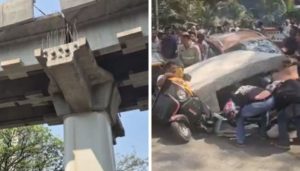Mumbai: 75-Year-Old Security Guard Succumbs to Cancer Amid Medical System Hurdles

Mumbai, 7th March 2025: A 75-year-old security guard battling cancer passed away on Wednesday morning after experiencing delays in receiving treatment at Mumbai’s Tata Memorial Hospital (TMH). Rajendra Joshi was unable to begin chemotherapy at TMH three days earlier due to an inconclusive diagnosis and the absence of a reliable caregiver to assist him through potential side effects, according to doctors.
Joshi initially sought medical attention at KEM Hospital on February 20, where doctors suspected he had hematolymphoid malignancy, a form of blood cancer. However, since KEM lacked the facilities to treat cancers beyond breast cancer, the hospital referred him to TMH, stated KEM dean Dr. Sangeeta Rawat. Upon his arrival at TMH, doctors requested biopsy slides and tissue blocks from KEM for histopathological analysis before initiating treatment.
His daughter, Kavita Joshi, who accompanied him to medical appointments, stated that she was not informed about the need to obtain additional biopsy materials. Dr. Lingaraj Nayak, a medical oncologist at TMH, explained that standard procedure prevents unnecessary repeat biopsies when previous samples are available. “We do not initiate chemotherapy based solely on a provisional diagnosis, as incorrect treatment could have serious consequences,” he said.
Joshi’s condition became critical. On February 26, he revisited TMH but was unable to provide the requested biopsy materials. A PET scan was suggested to further investigate the malignancy. Due to extended wait times at TMH, doctors recommended he undergo the scan at the Advanced Centre for Treatment, Research, and Education in Cancer in Kharghar. The earliest available appointment was March 6—the day he passed away.
His health deteriorated further, with complaints of leg swelling and breathlessness. Vikas Bali, chairman of Vijay Tower CHS in Andheri, where Joshi worked, arranged for an evaluation at Seven Hills Hospital. There, doctors diagnosed him with Non-Hodgkin’s Lymphoma. When Joshi returned to TMH on March 3, he was once again unable to provide the biopsy slides from KEM. This time, he was accompanied by an unknown attendant hired by Bali.
When questioned about whether TMH could have directly requested KEM to provide the necessary slides or blocks, TMH medical superintendent Dr. Sandeep Sawakare clarified that the hospital does not have such provisions, as patients typically bring these materials themselves.
While pre-phase chemotherapy—an initial low-dose treatment—can sometimes be administered to elderly patients without confirmed histopathology, it carries risks such as severe vomiting. “If a patient lacks a dependable caregiver to ensure timely follow-up visits, it could become life-threatening,” said Dr. Manju Sengar, a hemato-oncologist at TMH. The attendant assigned to Joshi reportedly stated that he could not guarantee he would be available for future visits.
Kavita Joshi insists she informed hospital staff that she would be available by the evening of March 3. However, TMH doctors claim they were not made aware of this. Dr. Sengar emphasized that all treatment decisions were guided by ethical concerns and patient safety. “There is a crucial distinction between treatment strategies for low-grade and high-grade lymphoma,” she said. “Without a confirmed histopathological report, chemotherapy cannot be administered. These are difficult decisions, but they are made in the patient’s best interest.”




